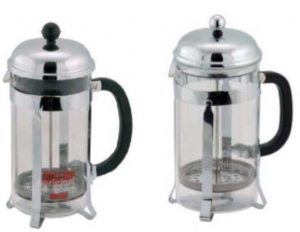Bodum USA, Inc. (“Bodum”) originally filed this case against A Top New Casting Inc. (“A Top”) in the Northern District of Illinois on claims of trade dress infringement. After a jury verdict found for Bodum and awarded $2 million in damages, A Top brought this appeal in the United States Court of Appeals for the Seventh Circuit. The Court of Appeals affirmed the findings and damages awarded.
 Bodum began selling French press coffeemakers in the 1970s and began distributing the Chambord French press at issue in this case in 1983. Bodum claimed it acquired exclusive distribution rights to the Chambord French press in 1991 and has since spent millions of dollars in marketing and advertising the product. A Top began selling their French press, the SterlingPro, through Amazon in 2014.
Bodum began selling French press coffeemakers in the 1970s and began distributing the Chambord French press at issue in this case in 1983. Bodum claimed it acquired exclusive distribution rights to the Chambord French press in 1991 and has since spent millions of dollars in marketing and advertising the product. A Top began selling their French press, the SterlingPro, through Amazon in 2014.
In March 2016, Bodum filed a complaint for “trade dress infringement under the Lanham Act, 15 U.S.C. § 1125(a); common law unfair competition; and violation of the Illinois Uniform Deceptive Trade Practices Act”. While A Top moved for summary judgment twice, these motions were denied, and a jury trial took place in March 2018. The jury found that A Top willfully infringed the Chambord trade dress and awarded Bodum $2 million in damages. The district court denied A Top’s motion for judgment as a matter of law and granted Bodum’s motion for enhanced damages to $4 million dollars and a permanent injunction against A Top selling the SterlingPro products.
A Top claimed on appeal that its motion for judgment as a matter of law should have been granted because they believed Bodum did not prove that the elements of the Chambord trade dress were nonfunctional. Further, A Top claimed that it should be granted a new trial because it believed several utility patents were improperly excluded from evidence under Rule 403. The Court of Appeals found in favor of Bodum on each of these claims with its rationale for each explained below.
The denial of the motion for judgment as a matter of law was reviewed de novo and the evidence was reviewed in light most favorable to the jury verdict. The Court of Appeals explained that to “establish it has a valid trade dress, Bodum did not have to prove that something like a handle does not serve any function. It merely needed to prove that preventing competitors from copying the Chambord’s particular design would not significantly disadvantage them from producing a competitive and cost-efficient French press coffeemaker.” Due to the evidence presented, the Court of Appeals found the jury was not irrational in reaching their conclusion regarding the non-functionality of the elements of the Chambord French press.
The exclusion of evidence of various utility patents was reviewed for abuse of discretion, meaning the Court of Appeals would only reverse the decision “if no reasonable person would agree with the district court’s view.” United States v. Proano, 912 F.3d 431, 438 (7th Cir. 2019). Rule 403 determinations are also given “special deference” because those determinations are made on the spot during trial and appellate judges typically do not second guess those decision. A Top was not able to point to any language in the patents it was seeking to admit as evidence that claimed any of the trade dress features. Further, the district court found even if the patents were relevant, the “teeny teeny probative value” did not outweigh the “massive potential for jury confusion.” The Court of Appeals found A Top’s case was not one in which it would “second-guess the trial judge’s weighing of the probative value of the evidence with the potential for jury confusion on a Rule 403 issue” and thus affirmed the denial of A Top’s motion for a new trial.
 Indiana Intellectual Property Law News
Indiana Intellectual Property Law News

